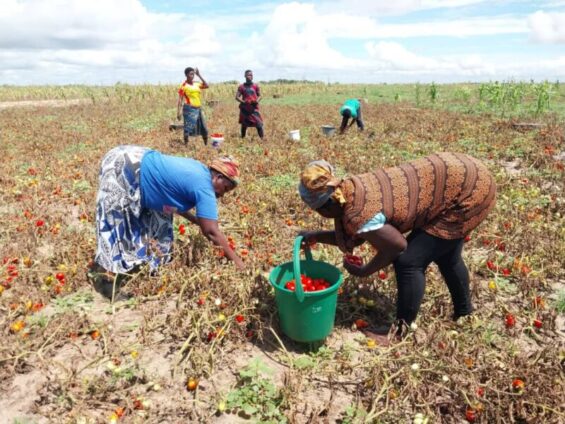As the world commemorates International Day of Rural Women, Ghana highlights the remarkable yet often overlooked contributions of rural women farmers who drive the nation’s food production.
In the Volta Region, where agriculture is the mainstay of rural folks, women play a pivotal role in cultivating crops like tomatoes. Yet, despite their vital contributions, these women continue to face daunting challenges that hinder their potential and growth.
Pearl Enam Makumator, Benedictor Amemawu, and Mawusi Auntia Sabblah, all tomato farmers in the Anloga District, are living examples of the struggles many rural women endure daily. During interviews, they highlighted issues such as poor access to credit, inadequate farming tools, and the high cost of fertilizers. These barriers limit their crop yields and ability to scale their farming operations.
"We put in all this hard work, yet accessing loans or support is a constant battle," says Pearl Enam Makumator, a farmer who has been cultivating tomatoes for over a decade. "The high cost of inputs like seeds and fertilizers drain our pockets, and often, we’re left with little profit after harvest."

Statistics from the Ministry of Food and Agriculture indicate that women make up around 50% of Ghana’s agricultural labour force. Yet, only 20% of these women own the land they farm, a disparity exacerbated by cultural norms that favour men in land ownership. This inequality significantly hampers rural women's ability to invest in and expand their farms, locking them into subsistence farming rather than commercial-scale agriculture.
The challenges are further complicated by the impacts of climate change, which disproportionately affect rural women farmers. Erratic rainfall patterns, prolonged droughts, and unpredictable floods have led to reduced yields in crops such as tomatoes, maize, and cassava.
According to the 2021 Ghana Agriculture Census, smallholder farmers, particularly women, have seen a decline in yields of up to 30% in some regions due to climate-induced risks.
Benedictor Amemawu shared her experience of losing nearly half of her tomato crop during an unexpectedly heavy rain last season. "We don’t have irrigation systems to fall back on when the rains fail, or measures to protect our crops when it floods. It’s heartbreaking to see months of hard work wiped away in an instant."

The Volta Regional Director of the Gender Department, Thywil Eyra Kpe, emphasized that rural women who venture into farming and fishing need more robust support. "These women are the backbone of their communities. Their role in food production is crucial, yet they remain marginalized. We must encourage and provide them with the resources they need to thrive," Kpe stated in an interview.
While various government initiatives, such as the "Planting for Food and Jobs" have made strides in improving the agricultural sector, the specific needs of rural women farmers must be addressed more aggressively.
Women like Mawusi Auntia Sabblah, who has been farming for over 15 years, noted that training on modern farming techniques and access to affordable credit could transform their livelihoods. "With just a little more support, we could produce much more and even access international markets," she said.
In addition to the obstacles of land ownership and climate change, rural women also face challenges in accessing markets. Poor road infrastructure in rural areas often means that women have difficulty transporting their produce to market centres, resulting in significant post-harvest losses.
According to a 2023 report by the Ghana Statistical Service, rural women farmers experience post-harvest losses of up to 40%, a figure that underscores the urgent need for improved rural infrastructure.
Despite these challenges, the resilience of women like Pearl, Benedictor, and Mawusi cannot be overlooked. They continue to sustain their families, support their communities, and contribute significantly to Ghana’s agricultural output. However, their potential remains untapped due to systemic barriers that demand immediate action.
As Ghana celebrates the International Day of Rural Women, the spotlight is on the need for comprehensive support to empower these women. Addressing issues like access to land, affordable credit, modern technology, and better infrastructure is not only a matter of justice but also a critical pathway to building a more resilient agricultural sector that can withstand the pressures of climate change and global economic shifts.
If rural women farmers are given the support they deserve, they have the potential to uplift their families, improve food security, and play a key role in the sustainable development of Ghana's economy.
The question now is not whether they can rise to the challenge, but whether the necessary support will be provided to help them do so.
The contributions of these women must be matched with tangible actions—support that ensures they continue to feed the nation, one harvest at a time.
Latest Stories
-
School of Hygiene in Ho demands release of its lecture halls occupied by UHAS
47 minutes -
Nike says Trump tariffs could raise its costs by $1bn
59 minutes -
‘Brilliant’ and ‘a real character’ – Liverpool sign Kerkez for £40m
1 hour -
Arsenal in talks to sign Valencia defender Mosquera
1 hour -
I went to Saudi for trophies, not money – Mendy
2 hours -
Man City put 5 past Juventus in Club World Cup
2 hours -
Ronaldo signs new deal with Saudi club Al-Nassr
2 hours -
Migrant crackdown risks choking off critical supply of US workers
4 hours -
Brad Pitt’s Los Angeles home ‘ransacked’, police say
4 hours -
Anna Wintour stepping back as US Vogue’s editor-in-chief
4 hours -
Iran carries out wave of arrests and executions in wake of Israel conflict
4 hours -
Egyptian man kicks customs dog airborne at Washington DC airport
4 hours -
What is Sean ‘Diddy’ Combs charged with and how long will his trial last?
4 hours -
A look at the key items in Trump’s ‘big, beautiful bill’
5 hours -
Are East African governments uniting to silence dissent?
5 hours

